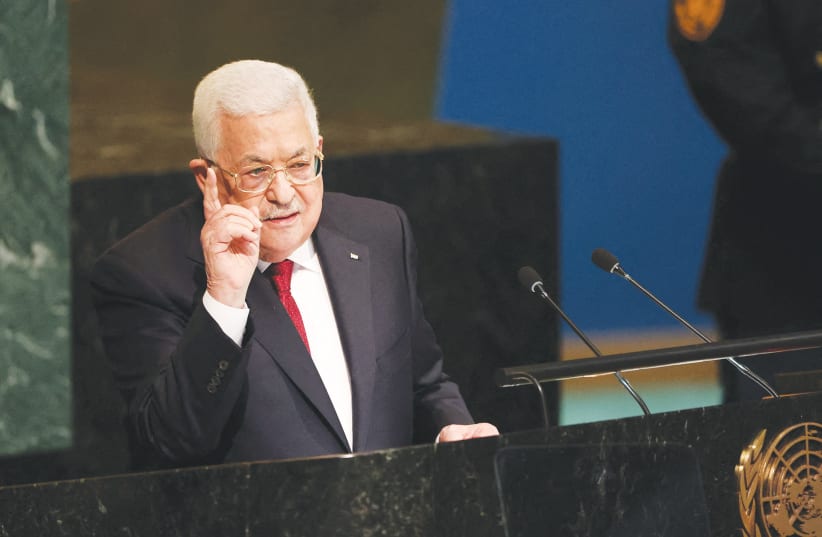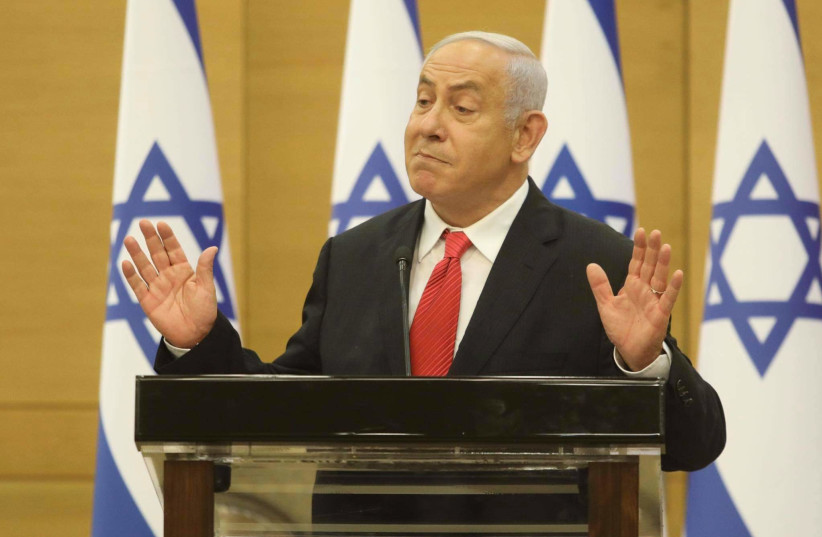The attacks on the prime minister’s recent call for a two-state solution prove again that electioneering is as kind to truth as Iranian mullahs are to hijab-free women. Israel’s leader chose to “state the whole truth” that “in the heart of our Jewish homeland, now lives a large population of Palestinians. We do not want to rule over them.”
He concluded, “In my vision of peace, there are two free peoples living side by side in this small land, with good neighborly relations and mutual respect, each with its flag, anthem and government, with neither one threatening its neighbor’s security and existence.” Perhaps he didn’t have to go so far and say “Let’s go in the path of … Yitzhak Rabin and King Hussein” – given the Oslo “peace” process’s failures. But it’s important for Israel’s prime minister to proclaim “Let us know peace” – without compromising security.
Admittedly, these were not Prime Minister Yair Lapid’s supposedly-treasonous words at the UN General Assembly. These were prime minister Benjamin Netanyahu’s words in his 2009 Bar-Ilan speech endorsing a two-state solution. As recently as 2016, Netanyahu told the UN – “I remain committed to a vision of peace based on two states for two peoples.”
It was therefore reasonable for Lapid to support “the vision of this two-state solution,” with “only one condition: that a future Palestinian state will be a peaceful one; that it will not become another terror base”. Examining Israel’s broken neighbors, Lapid delivered a great one-liner: “You can ask us to live according to the values in the UN Charter, but you cannot ask us to die for them.”
Today, as in 2009, a similar challenge haunts Israel: a Democratic president too sweet on the mullahs, too anxious to rush into a toothless nuclear deal with Iran. If anything, Lapid’s need to mollify President Joe Biden is even more compelling than Netanyahu’s need was to sweet-talk president Barack Obama. When Lapid spoke on September 22, Iran’s hair-raising protests over the murder of Mahsa Amini for exposing some hair were in their sixth day. President Biden had already declared “we stand with the brave citizens and the brave women of Iran.”
But Lapid remembers how Obama let down Iran’s Green Revolutionaries in 2009. He understands that America and the West have a big chance here to rattle the Iranian regime with rigorously-enforced economic sanctions, satellite support for protest networks, frozen nuclear negotiations and constant denunciations. They must not blow it. If stoking that potentially great opportunity required an Israeli diplomatic minuet, so be it. Israel needs weapons of war to survive, but we need some hopes for peace too – to reassure our allies – and to not get too demoralized ourselves.
The right move is often the shrewd move. Endorsing a two-state solution – with a demilitarized Palestinian state that accepts Israel’s legitimacy – remains the wisest and most politically-correct path toward peace. Mahmoud Abbas’s rancid UN speech showed fair-minded people the contrast – Israelis seek peace, Palestinian leaders: not so much.
Right-wingers deny it, but the contours of a Palestinian state already exist. They, like all Israelis, are banned from Gaza, and “Area A,” which leaves most Palestinian cities controlled by the Palestinian Authority. Netanyahu was correct: Whenever Palestinians wave their flags there, express their national heritage there, and finally start building civil society institutions and a people-oriented political culture, peace will come easily.
Even if that democratic day never arrives, if Palestinians accept the reality of Israel, as other Arabs have done – and start cooperating with Israel economically instead of boycotting – we might achieve stability. If, ultimately, Palestinian tribal and religious rivalries require cantons or geographic archipelagos, and if the lines dividing Israeli areas from Palestinian ones are as jagged as Republican – or Democratic – gerrymandered political districts, so be it. Life is messy.
Netanyahu's hippo-cracy
Instead of acknowledging the truth – and these nuances – Netanyahu and his worshipers falsely accused Lapid of offering Palestinians “a terrorist state in the heart of the country.” Worse than the usual hypocrisy, this is hippo-cracy, as big, obvious and ugly as a hippopotamus. And Netanyahu’s claim – that the world ignored the Palestinians until Lapid revived their cause – is delusional. Calling for a Palestinian state is ritualistic for western diplomats, Democratic presidents, most American Jews and even Republicans – including Donald Trump, who offered “a realistic two-state solution” in 2020.
Somehow, the Palestinian conflict makes people particularly hippo-critical – and hypercritical. Netanyahu and other right-wingers denounce what he endorsed, while left-wingers defend Palestinian behaviors they would otherwise denounce, from terrorism and dictatorship to homophobia and sexism.
Palestinian scholar Edward Said accused the West of “orientalism,” describing Arabs in condescending, imperialist terms; call this illiberal liberalism “dis-orientalism.” Romanticizing the Palestinians and demonizing Israel disorients everyone. That’s why Palestinians wearing bling showing maximal maps of a Palestinian state, leaving no room for any Jews, get lionized by the Left – while Jews even acknowledging our biblical boundaries are called “settler-colonialists.”
That’s why Palestinians terrorizing innocents are nevertheless forever-innocent, while Israelis defending themselves against terrorists are automatically guilty. And that’s why battlefield reporters killed accidentally anywhere else are mourned quickly as victims of “the fog of war,” but a Palestinian journalist killed by equally-stray bullets becomes a martyr.
All these harsh, demonizing, external attacks fuel an internal hysteria. When campaign after campaign politicizes this understandable defensiveness, the result is the silly, demagogic name-calling contest we keep getting about the Palestinians and peace – rather than the thoughtful, honest, constructive discussion we all deserve.
The writer is a distinguished scholar of North American history at McGill University, and the author of nine books on American History and four books on Zionism. He is the editor of the new three-volume set, Theodor Herzl: Zionist Writings, the inaugural publication of The Library of the Jewish People (www.theljp.org).

